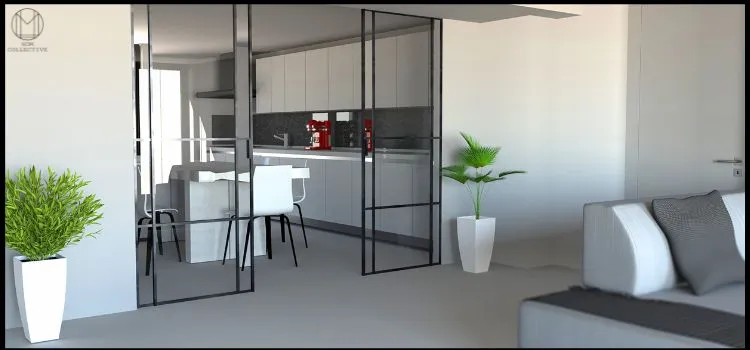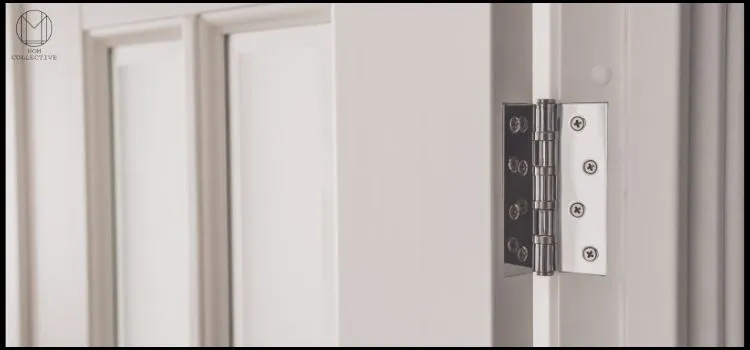Choosing doors for your home is a complex and vexing issue, and when it comes to the choice of hinged doors and sliding doors, the problem only gets more problematic. Which one to prefer for the better infrastructure and comfort of your gates depends on your personal lifestyle and preferences. This article will analyze the crucial sides of sliding and hinged doors to decide which serves as a better option.
How Do Sliding Doors Work?

A track mechanism powers sliding doors. They are made up of one or more panels that move across the horizontal plane, commonly on top and bottom tracks installed in the door frame. Therefore, they may be wall-mounted or pocket panels, sliding into a recess in the wall. They glide owing to rollers or gliders.
Sliding Door Systems Consist Of The Following Key Components:
- Tracks: The rails on which the door moves. They are attached to the ceiling, floor, or both.
- Rollers: Small wheels or gliders that enable the door to navigate the tracks easily.
- Panels: A door’s major structure, which can be made of glass, wood, and other substances. If a sliding door opens horizontally, the panels are generally greater in size and have additional features. For vertically opening doors, the panels are typically smaller, while for horizontal opening doors, they are often more exquisite.
- Stoppers: They are devices that hold the door from relocating any more than demanded.
How Does Hinged Doors Work?

Hinged doors fall under the fundamental type of doors used. One side is connected to the door frame by one or more hinges and pivots to allow the door to open and close. Some hinged doors will pivot in and others revolve outwards while others will do both depending on the type of hinge used and installation. They are made in different forms including single or double and can have additional designs and components for more than one material or finish and various hardware.
Also Read: UPVC Sliding Doors: A Complete Guide
Thus, The Primary Parts Of The Hinged Door System Are The Following:
- Hinges – are the metal connections, which place the door into the frame and make it mobile. They allow the movement of open to closed positions.
- Frame – is the construction outside the door that holds it.
- Handle and lock – the fittings create the opportunity to open and close the door, locking it in storage. Door Panel – is the main material of the door, it may be the full volume or consist of a significant part of the window, pane, or other style inserts.
- Door Panel – is the main material of the door, it may be the full volume or consist of a significant part of the window, pane, or other style inserts.
Sliding Doors vs Hinged Doors: Key Differences
1. Design and Structure
Sliding Doors
- Generally have one or several big panels,
- Mechanically glide along a track, which may be wall-mounted or pocket-style. Modern designs normally consist of large glass panes.
Hinged Doors
- These doors are mounted on the frame’s several hinges,
- They pivot to open and close,
- Most have single or double configurations,
- Some are solid while some have glass kicked into them.
2. Space Considerations
Sliding Doors
- They are ideal for rooms or areas with restricted space as they do not need space for a door swing-arc design or layout. Some examples include small rooms or patios or areas where furniture placing is essential.
- These doors can help create a seamless and airy feeling by equally connecting indoors and outdoors.
- If you are looking for the best Aluminium Sliding Door in Noida then Hom Collective is the best option for you to go ahead with.
Hinged Doors
- Require swing clearance space which may influence furniture layout- placement,
- In most occurrences, they’re better for rooms or areas that are way larger.
- At least they can give closed and traditionalism.
3. Aesthetic Appeal
Sliding Doors
- They’re simple, innovative, and modern,
- Glass Panels can increase light and not standard things.
- Looks and Membrane can get different materials, designs, and cooperation is feasible for contemporary building plans.
Hinged Doors
- They are traditional and actually placed,
- They could be very unstable, from classic textured and model materials.
- They are ornate due to the panels or aren’t the prospects
4. Functionality and Ease of Use
Sliding Doors:
- Large panels are equally easy to operate.
- They can be designed to open partially or fully.
- Automation is available in some models for added convenience.
- They are suitable for high-traffic areas because of their easy-glide operation.
Hinged Doors:
- They are straightforward to operate.
- They do not fail due to their simple mechanism, so they are long-lasting.
- The door handles are strong and reliable locks.
- They are easier to install and periodic maintenance compared to sliding doors.
5. Energy Efficiency
Sliding Doors:
- Many modern sliding doors use energy-efficient glass and have tight seals to reduce drafts.
- These doors can choose between double and triple glazing for better insulation.
- Improve insulation by using thermal breaks
Hinged Doors:
- Doors that swing open typically provide better insulation, as they have tighter seals around their frames.
- To insulate your home, fit door seals around your doors.
- Produce excellent thermal Resistance with a solid core and insulated doors.
6. Security
Sliding Doors:
- Higher quality locking mechanisms improve security.
- Safer glass due to laminated or tempered glass options.
- Other security features like sensors and reinforced frame available.
- Easier to break into if light is not properly secured against forced entry.
Hinged Doors:
- More secure, typically due to how the frame attaches.
- Many opportunities for locking due to multiple locking points and deadbolts.
- High resistance to break-in openings with solid core doors.
- Entry doors usually have more robust construction.
Also Read: Sliding Glass Doors: A Stylish and Practical Choice for Modern Homes
7. Cost Comparison
Sliding Doors:
- Price increase due to the need for a complex track system and large glass panels.
- Installation costs increase, particularly for pocket-style doors.
- Maintenance costs are higher over time.
Hinged Doors:
- Generally lower in price than sliding doors due to the standard sizes and materials used.
- Installation costs are lower.
- Wide range of prices depending on material quality and customization.
8. Impact on the Environment
Sliding Doors:
- The extensive use of glass panels can lead to an increase in energy consumption for heating and cooling.
- Modern energy-efficient sliding door models reduce its effect.
- Sliding doors can be made from sustainable materials and designed for recyclability.
Hinged Doors:
- On average, hinged doors have a smaller environmental footprint.
- Hinged doors can be made from sustainable materials and designed for high energy efficiency.
- They are also easier to repair and maintain, which increases their longevity. Thus, their waste is limited.
9. Sound Insulation
Sliding Doors:
- Overall good sound insulation with the installed thick and high-quality glass. Seals around the edges minimize sound leakage.
- Double or triple glazing is available for sliding doors, which enhances their acoustic properties.
Hinged Doors:
- There is better sound insulation due to a tighter seal.
- Solid core hinged doors are beneficial for blocking street noise.
- Additional soundproofing with materials is easier to install.
Advantages of Sliding doors
- Space-saving: ideal for use in areas with limited space.
- Modern Aesthetic: contemporary interior find design is very appealing.
- Enhanced Views and light diffusion: Large glass panels promote unobstructed spectacular outdoor views.
- Versatile: Use in patios and balconies, Wardrobes and closets, and as room dividers.
- Easy to operate: sliding tracks are user-friendly.
- Indoor-Outdoor Flow: This creates a seamless extension between indoor and outdoor spaces.
- Numerous customizable options: a variety of customizable colors and sizes are available.
Advantages of Hinged Doors
- A classic Aesthetic: could boost the visibility of the design in one’s home.
- Maintenance and convenience: easy to install and use.
- Better Insulation: inevitable insulator from noise and heat.
- Security lock: having a secure lock system with hinged doors more like a plastic
- Cost-effective: cheaper compared to sliding doors.
- Versatile: use both out and indoors.
Conclusion
Deciding whether to install sliding or hinged doors will depend on your specific requirements and preferences. Sliding doors suit small, modern homes and offer minimalistic aesthetics and effortless operation. In contrast, hinged options are known for their classic appearance, better security, and enhanced look for residential premises. Selecting the most appropriate option for your building will rely on their differences, advantages, and personal needs.
For the best quality sliding doors, you can approach trusted Glass Dealers in Noida who offer excellent deals and professional services.
FAQ’S
1. Are sliding doors more expensive than hinged doors?
Yes, sliding doors tend to be more expensive because of the complex mechanism and large glass panels involved in their design. The installation could also hike with pocket-style designs. However, the price depends on the materials and customizations to be done.
2. Do hinged doors require more frequent maintenance than sliding ones?
Hinged doors require less maintenance than sliding doors. The latter must clean the tracks every day to remove debris and clean the roller once a week, requiring occasional lubrication. Hinge doors need the hinges lubricated periodically and the screws tightened. However, both might require specific maintenance procedures based on materials and use.
3. Which doors are better for small rooms?
Sliding doors are better with limited space since they do not need clearance as hinged doors. They maximize available space and consider the beautiful framework in the design. Hinged doors need more room when open.
4. What maintenance is required for sliding and hinged doors?
Sliding doors: cleaning of tracks, application of lubricant on rollers and ensuring the seals are in good condition, and glass cleaner spray on the glass to maintain its clarity. Re-greasing may also be done after overturning.
Hinged doors require hinge lubrication, screw-tightening, and painting or refinishing for woods. With this overview, one can choose the best door type considering the home design, functionalism, and budget.
